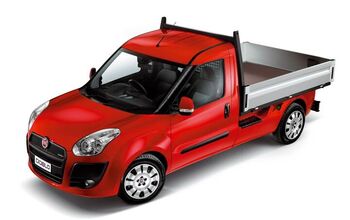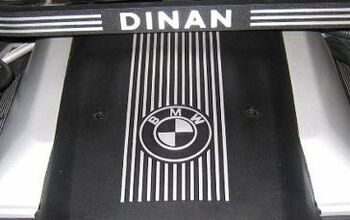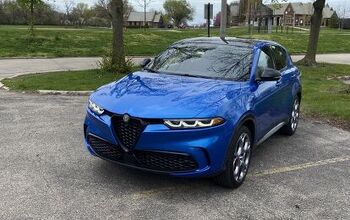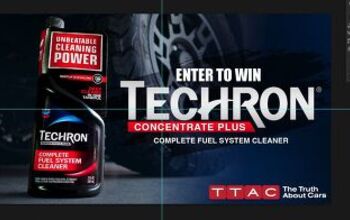Ask The Best And Brightest: Wave Disc Engines?
We love staying ahead of the curve with new engine technologies like the Ecomotors OPOC engine, but without an engineering degree it can be hard to tell the the posers from the next big thing. So when something like the Wave Disc engine comes along, we throw ourselves upon the collective wisdom of our Best and rightest to help us make sense of it. In the video above, the Wave Disc engine’s creator, Michigan State’s Norbert Muller, explains his invention and its benefits including simplicity, light weight and efficiency. And, he claims, the technology is close enough to reality to have a Wave Disc-electric hybrid within three years. Hit the jump for more technical details, and be sure to let us know if this is worth watching or just another engineering dead-end.
New Scientist describes the Wave Disc’s operation:
As the rotor spins, the channels allow an air-fuel mixture to enter via central inlet ports. The mixture would escape through the outlet ports in the walls of the surrounding chamber, but by now the rotor has turned to a position where the channels are not pointing at the outlets.
The resulting sudden build-up of pressure in the chamber generates a shock wave that travels inwards, compressing the air-fuel mixture as it does so. Just before the wave reaches the central inlet ports, these too are shut off by the turning of the rotor.
The compressed mixture is then ignited. By this time the rotor’s channels are pointing towards the outlet ports again, releasing the hot exhaust. As the gas escapes at high speed, it pushes against the blade-like ridges inside the rotor, keeping it spinning and generating electricity.
In a hybrid application, however, Muller indicates that it would actually drive the wheels, and electrical power would assist in high-load circumstances.
In a PDF on the Wave Disc project, MSU describes the engine’s advantages:
MSU’s shock wave combustion generator is the size of a cooking pot and generates electricity very efficiently. This revolutionary generator replaces today’s 1,000 pounds of engine, transmission, cooling system, emissions, and fluids resulting in a lighter, more fuel-efficient electric vehicle. This technology provides 500-mile-plus driving range, is 30% lighter, and 30% less expensive than current, new plug-in hybrid vehicles. It overcomes the cost, weight, and driving range challenges of battery-powered electric vehicles.
The engine is also adaptable to multiple types of fuel, including hydrogen and natural gas. The government sees it as promising enough to fund research to the tune of $2.5m. But do you see this technology coming to the roads in just a few years? Given how many once-promising engine technologies have failed to live up to their promises, it’s by no means a foregone conclusion.
More by Edward Niedermeyer
Latest Car Reviews
Read moreLatest Product Reviews
Read moreRecent Comments
- VoGhost Just reminding us all that we have to tolerate dealers (many of whom are billionaires) in the US if we want new legacy ICE vehicles because the dealers pay for the campaigns of local politicians, with our money.
- 1995 SC I'm still trying to get past the fact that the Red Bull guy is married to a Spice Girl.
- Ravenuer Not into F1. Started watching NASCAR back when they raced actual cars. (yeah I'm that old). Not any more. They aren't "stock cars" now. Not even close. Even drag races don't interest me anymore. Races are over in 3 seconds.
- Wjtinfwb No confusion on my end, Ghost. The Government has zero role in job creation outside of the legitimate opportunities' created by Government going about it's responsibilities, namely keeping the American people and territory safe from foreign intrusion. Of course, they're failing epically at that but that's a different topic. The American free enterprise system is what enables job creation. Government's role is to stay out of the way of that system, but they seem incapable of doing so. Oil & Gas exploration is just one example. If a National Job Policy is what you're looking for, there are other countries that will be happy to accept your application for residency.
- Michael Smith I drive 100-300 miles a day in new BMWs, Mercedes-Benzes, and GM SUVs. Some are already equipped with automatic braking.It's the first thing I turn off when I start the car.I've had experiences where (as the author notes) the system gave false alarms and stabbed the brake pedal, threatening my ability to control the car.Further, every driver encounters situations where, for example, legal following distance must be momentarily compromised in order to avoid a difficult situation. When the system intervenes, it disrupts the driver's plan of action. This can lead to a collision as the driver has to suddenly react not to his surroundings, but to the system.Not only is automatic braking an insult to skilled drivers, it's dangerous to everyone.

































Comments
Join the conversation
Here's a compressor/expander that in principal could be set up as an engine http://www.youtube.com/watch?v=5VHPEbEDulw I came across this in the 90's and it looks like they are making progress in specialized applications - then, sealing and tribology were issues, plus the need for very precise machining. In the late 70's, Union Carbide did some research on dual pistons in a cylinder (like OPOC) and that was meant to run without cooling. Or lubrication. Not a problem if you made it out of silicon carbide, except you needed strength and very close to net size casting - good luck machining that stuff.
Ummm , where is the expandable volume of the chambers to allow the expanding burning gasses to apply mechanical force??